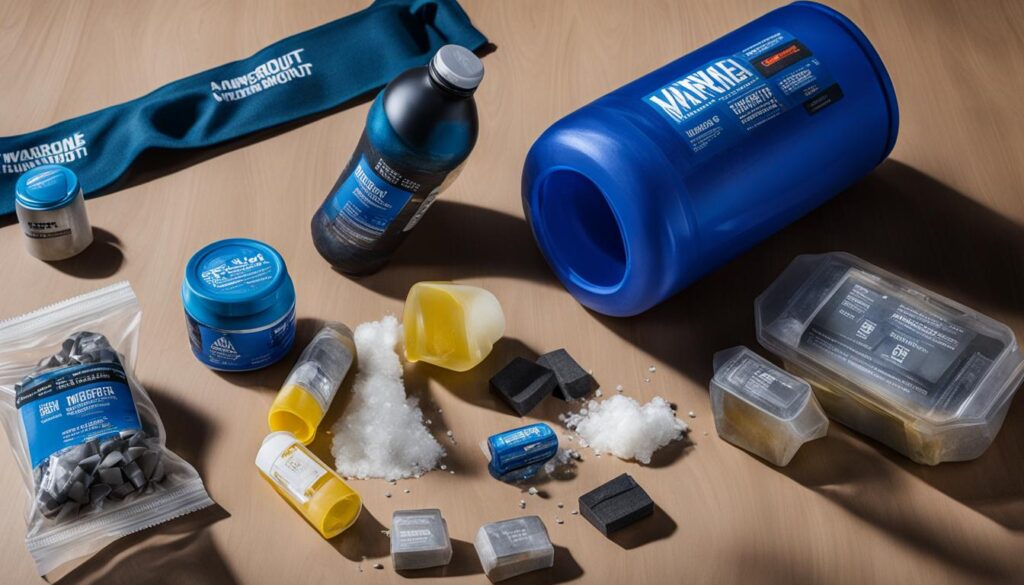For fitness enthusiasts, pre-workout supplements have become a staple in their exercise routine. These fitness supplements promise to give you an edge, increase your endurance, and help you push through tough workouts. However, with the rising popularity of pre-workout supplements comes concerns about their safety and potential risks they may pose to your health.
In this comprehensive guide, we will delve into the safety, side effects, and potential dangers associated with pre-workout supplements. By exploring the truth behind these fitness supplements, you’ll gain a better understanding of their impact on your overall well-being.
Key Takeaways
- Pre-workout supplements are used by fitness enthusiasts to enhance performance.
- Concerns about the safety and potential risks associated with pre-workout supplements exist.
- Understanding the truth behind pre-workout supplements is essential when considering their use.
- Taking a balanced approach to pre-workout supplement use can help minimize potential risks.
- There are alternative fitness supplements that can provide similar benefits to pre-workout supplements without potential risks.
What is Pre-Workout?
Pre-workout supplements are a type of fitness supplement commonly taken before physical exercise to enhance performance. They are typically available in powder or pill form and are formulated with various ingredients aimed at boosting energy, focus, and endurance during workouts. These supplements are intended to help athletes and fitness enthusiasts maximize their workout routines and achieve their fitness goals.
One of the most common active ingredients in pre-workout supplements is caffeine, which is known for its stimulatory properties. Other popular ingredients found in pre-workout supplements include creatine, beta-alanine, and nitric oxide boosters, among others.
While pre-workout supplements are widely used, it’s important to note that they are not regulated by the FDA and may contain potentially harmful ingredients. As a result, it’s important to exercise caution and carefully evaluate the safety of any pre-workout supplement before adding it to your fitness regimen.

Common Ingredients in Pre-Workout Supplements
| Ingredient | Function | Example Products |
|---|---|---|
| Caffeine | Stimulant, increases alertness and energy levels | Cellucor C4, Optimum Nutrition Gold Standard Pre-Workout |
| Creatine | Increases strength, power, and endurance | MuscleTech Cell Tech Creatine, BSN NO-Xplode Pre-Workout Supplement |
| Beta-alanine | Increases endurance and delays fatigue | Optimum Nutrition Beta-Alanine, BSN N.O.-Xplode Pre-Workout Supplement |
| Nitric oxide boosters | Increase blood flow and support muscle growth | BPI Sports 1.M.R. Vortex, Cellucor NO3 Chrome Nitric Oxide Booster |
Safety of Pre-Workout Supplements
Pre-workout supplements have become increasingly popular among fitness enthusiasts seeking to improve their gym performance. However, one crucial aspect that cannot be overlooked is their safety.
While pre-workout supplements generally contain ingredients believed to enhance energy, focus, and endurance, some of these substances can be harmful if not consumed in moderation. Most common ingredients in pre-workouts such as caffeine may cause jitters, insomnia, and rapid heart rate if taken in excess.
Harmful additives such as ephedrine, dimethylamylamine (DMAA), and yohimbine have been banned by the FDA due to their dangerous side effects. However, some pre-workout supplements are still known to contain these substances illegally.
It is, therefore, essential to purchase pre-workout supplements from reputable and trustworthy sources, ensuring that they comply with FDA guidelines and do not contain any banned substances. Regulating intake by following recommended dosage guidelines is another way to ensure safety while using pre-workout supplements.

Additionally, people with underlying health conditions such as high blood pressure, heart problems, or diabetes should consult with a healthcare professional before using any pre-workout supplements. Pregnant women and those breastfeeding should also avoid using these supplements due to a lack of research into their effects on fetal and infant health.
Summary
Pre-workout supplements are a convenient means of enhancing workout performance, but they have the potential to pose health risks if not used safely. Therefore, it is vital to choose products that comply with FDA guidelines, avoid banned substances, and regulate intake to comply with recommended dosages. Seek medical advice before consumption if you have underlying health conditions, and avoid pre-workout supplements during pregnancy or breastfeeding.
Side Effects of Pre-Workout
Although pre-workout supplements may enhance exercise performance, they also come with potential side effects that cannot be ignored. Before incorporating pre-workout into your fitness routine, it’s important to understand the potential side effects and how to mitigate them.
Common side effects of pre-workout include:
| Side Effect | Description |
|---|---|
| Insomnia | Pre-workouts containing caffeine and other stimulants may make it difficult to fall asleep or stay asleep. |
| Jitters or Anxiety | Higher doses of stimulants may cause feelings of jitteriness or anxiety during exercise. |
| Dehydration | Pre-workout supplements accelerate sweat production, leading to dehydration when not enough water is consumed. |
| High Blood Pressure | Stimulants contained in pre-workouts can cause an increase in blood pressure and may be risky for individuals with hypertension. |
Although these side effects can be concerning, they can often be reduced with proper dosage and hydration. As with any supplement, it’s important to consult with your healthcare provider before adding pre-workout to your fitness routine.

Unveiling the Dangers of Pre-Workout
Beyond the side effects, pre-workout supplements can be dangerous when used incorrectly or without proper supervision. The dangers associated with pre-workout use can include:
- Cardiovascular problems, such as high blood pressure, chest pain, and heart palpitations.
- Dehydration, which can lead to kidney problems.
- Dependency and addiction, as pre-workout supplements often contain stimulants.
- Increased risk of injury, as individuals may feel invincible or fail to listen to their bodies when under the influence of pre-workout.
It’s crucial to approach pre-workout use with caution and to consult with a healthcare professional before beginning any new supplement regimen. Additionally, it’s important to carefully read labels and ingredient lists for potential allergens or interactions with other medications.

“It’s easy to get caught up in the promises of pre-workout supplements, but individuals need to be aware of the potential dangers associated with their use and approach these products with caution.”
Evaluating the Research on Pre-Workout
When searching for answers on the safety and effectiveness of pre-workout supplements, it’s important to consider the research available. By examining multiple studies, we can identify patterns and gain a more comprehensive understanding of pre-workout supplements’ effects.
One study published in the Journal of the International Society of Sports Nutrition explored the effects of a pre-workout supplement containing caffeine, creatine, and amino acids on strength and power in resistance-trained males. The results showed that the supplement significantly improved performance compared to a placebo group. However, the study also highlighted potential side effects such as increased heart rate and blood pressure, indicating the need for caution when using these products.
Another research published in the International Journal of Exercise Science aimed to investigate the effects of a pre-workout supplement containing caffeine, creatine, and beta-alanine on resistance-trained individuals’ muscular endurance and peak power. The study concluded that supplementation enhanced muscular endurance but had no significant effect on peak power. It was also noted that caffeine intake may increase the risk of adverse effects.
To summarize, while some research indicates that pre-workout supplements may enhance athletic performance, it’s essential to be mindful of their potential risks and side effects. Moreover, limited research and variations in ingredients and dosages challenge the reliability of these products. Consulting with healthcare professionals and carefully considering your individual needs and goals before use is always recommended.
How to Choose a Safe Pre-Workout Supplement
With numerous pre-workout supplements available in the market, it can be overwhelming to choose the right product. The following factors should be considered to ensure a safe pre-workout supplement:
Evaluate the Ingredients
It’s crucial to carefully read and understand the ingredients list before purchasing a pre-workout supplement. Make sure to avoid products with ingredients that might trigger allergies and have adverse side effects, such as high caffeine content, artificial sweeteners, and preservatives. Opting for supplements with natural and minimally processed ingredients could reduce the risk of adverse effects.
Consult with Healthcare Professionals
Before incorporating any supplements into a fitness routine, individuals should always consult with their healthcare professionals. This is to ensure that it is safe for them to consume considering their medical condition, allergies, and any medications they are taking.
Evaluate the Product’s Reputation
A product’s reputation is a crucial factor to take into account when choosing a safe pre-workout supplement. Checking for online reviews, product ratings, and customer feedback can be helpful in evaluating the product’s safety and efficacy. Always opt for supplements from a reputable brand known for producing high-quality products.
Choosing a safe pre-workout supplement is essential to maximizing the benefits it can offer while minimizing potential risks. By evaluating the ingredients, consulting with healthcare professionals, and researching the product’s reputation, individuals could make informed decisions about incorporating pre-workout supplements into their fitness regimens.
Alternatives to Pre-Workout Supplements
If you’re hesitant about using pre-workout supplements, or if you simply prefer alternative options, there are several fitness supplements that can provide similar benefits to pre-workout without the potential risks. Here are some popular options to consider:
Caffeine
Caffeine is a natural stimulant that can improve focus, boost energy levels, and enhance endurance during exercise. It’s also a common ingredient in many pre-workout supplements. Consuming caffeine from sources like coffee, tea, or energy drinks can be a safe and effective way to amp up your workout.
Creatine
Creatine is a compound naturally produced in the body that plays a critical role in energy metabolism. Taking a creatine supplement can help improve strength, power, and performance during exercise, making it a popular choice for athletes and fitness enthusiasts alike.
Branched-Chain Amino Acids (BCAAs)
Amino acids are the building blocks of protein and are essential for muscle growth and recovery. BCAAs, in particular, can help reduce muscle breakdown during exercise, leading to improved performance and decreased muscle soreness. BCAAs are commonly found in protein-rich foods like meat and eggs but can also be taken in supplement form.
Nitric Oxide Boosters
Nitric oxide boosters work by increasing blood flow to the muscles, leading to improved endurance and performance during exercise. These supplements are often formulated with ingredients like L-arginine, citrulline, and beetroot extract.
Beta-Alanine
Beta-alanine is an amino acid that can help improve muscular endurance by reducing lactic acid buildup in the muscles. This compound can be found in many pre-workout supplements but can also be taken alone.
Overall, there are several alternatives to pre-workout supplements that can provide similar benefits without the potential risks. However, it’s important to speak with a healthcare professional before adding any new supplements to your routine.
Balanced Approach to Pre-Workout Use
While pre-workout supplements can offer numerous benefits in terms of physical performance, it’s important to use them responsibly. Adhering to a few simple strategies can help ensure their safety and effectiveness.
1. Start with a Low Dose
Starting with a low dose of pre-workout supplement can help you avoid any potential adverse side effects. Gradually increasing the dose can help you determine the optimal amount for your body.
2. Stay Hydrated
Pre-workout supplements can cause dehydration. It is essential to stay well-hydrated before, during, and after your workout. Drinking a sufficient amount of water can help you avoid potential side effects such as headaches, dizziness, and nausea.
3. Consult with a Healthcare Professional
Before using pre-workout supplements, consult with a healthcare professional. Your doctor or trainer can help you determine if pre-workout supplements are safe for your body and give you personalized guidance on how to use them effectively.
4. Cycle Your Use
It’s essential to cycle the use of pre-workout supplements. Overusing these supplements can desensitize the body to their effects, reducing their overall effectiveness. Cycling can also help mitigate the potential negative long-term effects of these supplements.
5. Choose Reliable Products
Choosing reputable and reliable brands of pre-workout supplements can help ensure their safety and effectiveness. Be sure to read the labels carefully to identify any potentially harmful ingredients and choose products that have been tested for purity and quality.
By following these simple strategies, you can enjoy the benefits of pre-workout supplements while minimizing potential risks. It’s essential to prioritize your safety and well-being to achieve optimal fitness results.
Conclusion
Pre-workout supplements are a popular choice for fitness enthusiasts looking to enhance their performance during exercise. However, as we’ve explored in this comprehensive guide, there are potential risks and side effects associated with their use.
It’s important to approach pre-workout supplements with caution and to consult with healthcare professionals before incorporating them into your fitness routine. By evaluating the ingredients, researching the product’s reputation, and practicing responsible consumption, individuals can maximize the benefits while minimizing potential risks.
Ultimately, the decision to use pre-workout supplements should be based on an informed understanding of their impact on overall well-being. With the appropriate precautions and a balanced approach, pre-workout can be a valuable tool to help individuals reach their fitness goals.
FAQ
Is pre-workout bad for you?
The safety and potential health risks associated with pre-workout supplements depend on various factors, including individual tolerance, dosage, and overall health. While pre-workout can offer benefits such as increased energy and focus during workouts, it is essential to use them responsibly and consult with healthcare professionals.
What are the side effects of pre-workout?
Common side effects of pre-workout supplements may include increased heart rate, elevated blood pressure, jitters, insomnia, digestive issues, and potential allergic reactions. However, the severity and occurrence of side effects can vary among individuals. It is always advisable to start with lower dosages and evaluate how your body responds.
Are there any dangers associated with pre-workout use?
Misuse or excessive consumption of pre-workout supplements can pose certain dangers, such as dehydration, kidney damage, cardiovascular issues, and dependence on the products for energy. It is crucial to follow recommended dosage guidelines and seek medical advice if you have any underlying health conditions.
What research has been done on pre-workout supplements?
Several studies have examined the efficacy, safety, and potential side effects of pre-workout supplements. While some research suggests potential benefits like improved exercise performance and increased muscle endurance, more studies are needed to establish definitive conclusions on their long-term impact. It’s important to rely on evidence-based research and consult with healthcare professionals.
How can I choose a safe pre-workout supplement?
When selecting a pre-workout supplement, it is crucial to consider factors such as the brand’s reputation, ingredient transparency, certifications, and consulting with healthcare professionals. Look for products that have undergone third-party testing and have a history of positive user reviews. This ensures you are choosing a safe and reliable supplement.
Are there alternatives to pre-workout supplements?
Yes, there are alternative fitness supplements that can offer similar benefits without the potential risks associated with pre-workout use. Some alternatives include caffeine, natural energy-boosting foods, and specific amino acids like beta-alanine and creatine. It’s essential to explore these alternatives and find what works best for your body and fitness goals.
How can I take a balanced approach to pre-workout use?
To take a balanced approach, it is crucial to follow recommended dosage guidelines, avoid excessive consumption, and listen to your body’s signals. Incorporate rest days into your workout routine and focus on overall health through proper nutrition, hydration, and adequate sleep. Regularly evaluate the benefits and potential risks of pre-workout use and consult with healthcare professionals.


Leave a Comment